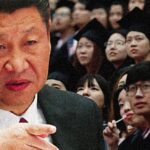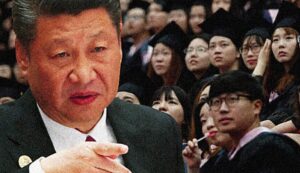
China Attacks, a novel by policy analysts Chuck Devore and Steve Mosher, appeared in 2013. It reappeared this month in a new form, as a think piece by Devore: “3 Ways China Could Strike Taiwan and What It Means for the U.S.” (The Federalist, April 3, 2025). It’s useful to delimit some of the growing talk about attacks on the Republic of China.
Three scenarios
Devore argues that Red China “has three basic ways to grab Taiwan: a slow naval stranglehold, a lightning strike on Taipei, or a wild global attack….”
These are worth a few simple thought experiments.
Devore’s stranglehold option envisions not just a blockade but also action by the U.S. to break the blockade. This assumes too much too fast.
Start by considering just a blockade. If there is no shooting, there will be many possible variations of this scenario, including the possibility of U.S. and allied warships escorting commercial traffic past the blockaders, thus breaking the blockade (at the risk of war).
The start of a “slow stranglehold” has a diplomatic effect, energizing neighboring states while giving them time to form a temporary defensive alliance, one that might even harden into a NATO-like structure. This is the worst possible outcome for Beijing, the creation of a ring of enemies on its periphery. Even if the blockade produces the surrender of Taipei, the communists will have created a wall of permanent enmity.
Moreover, blockades being, in law, acts of war, the PRC will also have blockaded itself once trade halts on the East and South China Seas. Blockade on, insurance rates up. No imports, no exports. This is the strongest consideration against the stranglehold idea. Which China would relent first?
A “lightning strike” faces the same possibilities of diplomatic disaster and an economic freeze, making the costs of this option very high. There is also the risk that the effects of a “lightning strike” would persist long after the lighting dissipates if the U.S. intervenes because of the strike. The short war on the ROC thus become a longer war with the U.S., with all the disadvantages of a longer war.
The “wild global attack” Devore imagines to be the launch of a war against U.S. forces and installations worldwide in tandem with war against the ROC. This reminds one of the recklessness of the Pearl Harbor attack or of Hitler’s declaring war on the U.S. after Pearl Harbor. It would take an irrational actor to implement this option, and Beijing has shown nothing but rational calculation. Wild attack combines all the disadvantages of the previous two scenarios with the likelihood of a long war.
Ambiguities
Would the U.S. intervene? U.S. policy has been to maintain “strategic ambiguity” in this case. But Beijing must do worst-case planning, which means Beijing has to count on intervention being triggered.
Yet it seems that Washington has lately been blowing away the mists of ambiguity around its Taiwan policy.
We have, for instance, Secretary of Defense Pete Hegseth urging commanders to “prioritize deterring China’s seizure of Taiwan.”
Not much ambiguity there.
On the other hand, maybe in an effort to prod the military bureaucracy, he gave the discouraging word that Beijing’s hypersonic missiles “can take out 10 aircraft carriers in the first 20 minutes of the conflict,” adding that the U.S. “loses to China in every war game.” These points have been rattling around the military press for a long time without being proclaimed at this level. They suggest an easy PRC negation of the U.S. threat.
Ambiguity restored?
Earlier this month, Admiral Samuel Paparo, the head of United States forces for the Indo-Pacific, gave remarkable testimony to the U.S. Senate.
Should China try to take Taiwan militarily, it would result in a 25 percent gross domestic product contraction in Asia and it would have a “knock on effect of 10 to 12 percent GDP reduction in the United States of America,” Paparo told the Senate Armed Services Committee on Thursday.
The unemployment rate in the U.S. would spike “7 to 10 points above base and likely 500,000 excess deaths of despair above base as well,” he added.
“A successful American intervention [is] still a grave result, but half as grave,” he said. “The savings of a lot of human misery.”
Paparo’s exactitude is suspect: 25 percent, 10 to 12 percent, 7 to 10 points, 500,000 suicides. These are things he cannot know, yet he asserts them with such specificity. One is reminded of philosophy professor Harry Frankfurt’s characterization of BS: “unavoidable whenever circumstances require someone to talk without knowing what he is talking about.”
A more famous professor, Richard Feynman, said that he’d learned “how hard it is to get to really know something, how careful you have to be about checking the experiments…. I know what it means to know something, how easy it is to make mistakes and fool yourself…. And therefore I see how they [experts] get their information, and I can’t believe that they know it. They haven’t done the work necessary, haven’t done the checks necessary, haven’t done the care necessary. I have a great suspicion that they don’t know…and they’re intimidating people.”
The first clue is always round numbers—very round numbers.
“They’re intimidating people.” Paparo is certainly trying to intimidate the senators, and one suspects that he doesn’t care whether his specifics are right or wrong. He’s leading the senators to a conclusion: war with Red China will produce for us a “grave result.”
Even more ambiguity restored?
Paparo’s comment on such a war’s benefit (or half-benefit) is interesting, replacing calculation of U.S. interests with “the savings of a lot of human misery.”
“The savings of a lot of human misery” sums up Samantha Power’s doctrine of “humanitarian intervention,” so much in vogue during the Obama and Biden administrations of which she was a policy guru. Perhaps Paparo entered the flag-officer career track when humanitarian intervention outweighed national interest. Or perhaps this is his oblique way of saying the U.S. does not have an interest in the defense of the ROC.
Another scenario
Getting back to Devore’s article, one is tempted to join in the scenario game.
Try this: Beijing succeeds in getting an amenable government elected on Taiwan, showers it with attractive promises and guarantees, concludes a peaceful annexation, and then reneges on everything agreed upon.
That would be a solid historical communist approach. It’s cheaper, safer, with no material damage. And it offers rich rewards to the looters who take over the island.
It’s not likely. Yet it’s more likely than the conflict scenarios we have been reading about. □
James Roth works for a major defense contractor in Virginia.
Also see:
StoptheCCP.org: “What War Between Beijing and Taipei Would Really Mean”











